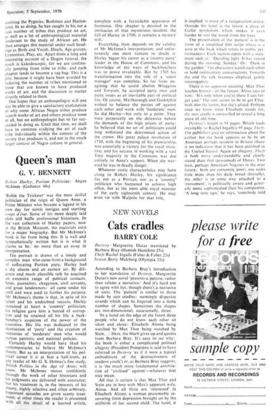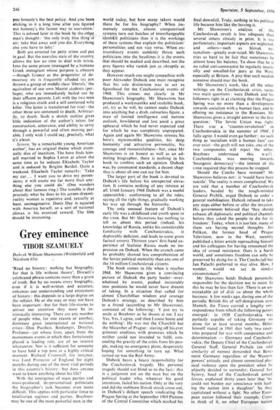NEW NOVELS
Cats cradles
BARRY COLE
Destroy Marguerite Duras translated by Barbara Bray (Hamish Hamilton 25s) Theft Rachel Ingalls (Faber & Faber 22s) Screen Barry Malzberg (Olympia 32s) According to Barbara Bray's introduction to her translation of Destroy, Marguerite Duras's new novel 'presents a pattern, rather than relates a narrative.' And it's hard not to agree with her, though there's a narrative of sorts. The 'pattern' is similar to those made by cats cradles: seemingly disparate strands which can be fingered into a finite number of shapes. Sometimes the shapes are two-dimensional; occasionally, three.
'In a hotel on the edge of the forest three people who do not know each other sit silent and alone: Elisabeth Alione being watched by Max Thor being watched by Stein...* Here, the blurb gives up and quotes from Barbara Bray. It's easy to see why: the book is either a complicated political allegory (President Pompidou is said to have referred to Destroy 'as if it were a typical embodiment of the destructiveness of modern youth') or, as Barbara Bray suggests, it is 'the much more fundamental annihila- tion of "civilised" egoism'—whatever that may mean.
All that is certain is that Max Thor and Stein are in love with Max's apparent wife, Alissa. And all three are 'interested' in Elisabeth Alione, a woman presumably re- covering from depression brought on by the stillbirth of her second child. The hotel, it
is implied, is more of a recuperation centre. Outside the hotel is the forest, a piece of Gallic symbolism which makes it even harder to sort the wood from the trees.
The presentation of the 'pattern' is in the form of a simplified film script (there is a note at the back which refers to public per- formances). Each section opens with a state- ment such as: 'Dazzling light. It has rained during the morning. Sunday.' Or: 'Dusk in the garden.' "[he characters watch each other or hold rudimentary conversations. Towards the end the talk becomes elliptical, gently interrogatory.
There is no apparent meaning. Max Thor teaches history—of the future. Alissa says to him: 'It's only when you're there I can for- get you.' The aim seems to be to get Elisa- beth into the forest, but she's afraid. Perhaps once we know what Elisabeth stands for, the =it cradle is unravelled to reveal a long piece of old rape.
Destroy's length is 94 pages. Which leads inevitably to Rachel Ingalls's 95-page Theft. The publishers give no information about the author but the book appears to be by an American perhaps resident in Britain (there is no indication that it has been pulished in the United States), Again an allegory, Theft is both more understandable and clearly stated than that (presumed) of Duras. Two men, perhaps American Negroes in the near future: both are extremely poor; one seeks little more than his daily bread (literally), the other is in some way attached to a 'movement', is politically aware and genet-- ally more sophisticated than his companion. 'A long time ago,' he says, 'somebody told
you honesty's the best policy. And you been sticking to it a long time after you figured out honesty's the fastest way to starvation.' This is echoed later in the book by the okK, man's thought: `the only truly free thing ii air; take that away and you die. Everything else you have to take.'
Both are arrested for petty crime and put in gaol. But the anarchic state of the country allows the law no time to deal with trivia. Into the same prison (managed by a humane Greek immigrant whose purpose is obscure —though Greece as the progenitor of de- mocracy etc is frequently alluded to) are thrown a group of middle class `liberals,' the equivalent of our own Maoist students (per- haps), who are immediately bailed out by their affluent parents. Left with the two men is a religious crank and a self-confessed wife killer. The latter is transferred for trial—the other three are sentenced to death. Arbitrar- ily, to death. Such a sketch outline gives little indication of the author's talent for construction, coherence, and ability to carry through a powerful and often moving par- able. I only wish I could say, precisely, what it's about.
Screen. `by a remarkable young American author', has an original theme which event- ually dies of inanition. The hero finds him- self married to Sophia Loren at about the same time as he seduces Elizabeth Taylor and is seduced by Brigitte Bardot. Quite a weekend. Elizabeth Taylor remarks: `Take my car... I want you to drive my posses- sions; it will excite me far more than any- thing else you could do.' (One wonders about that famous ring.) The trouble is that precisely what he does to his screen-dreamt- reality women is repetitive and, sexually at least, unimaginative. Doris Day is equated with America herself, so a sort of national climax is his eventual reward. The film should be interesting.































 Previous page
Previous page